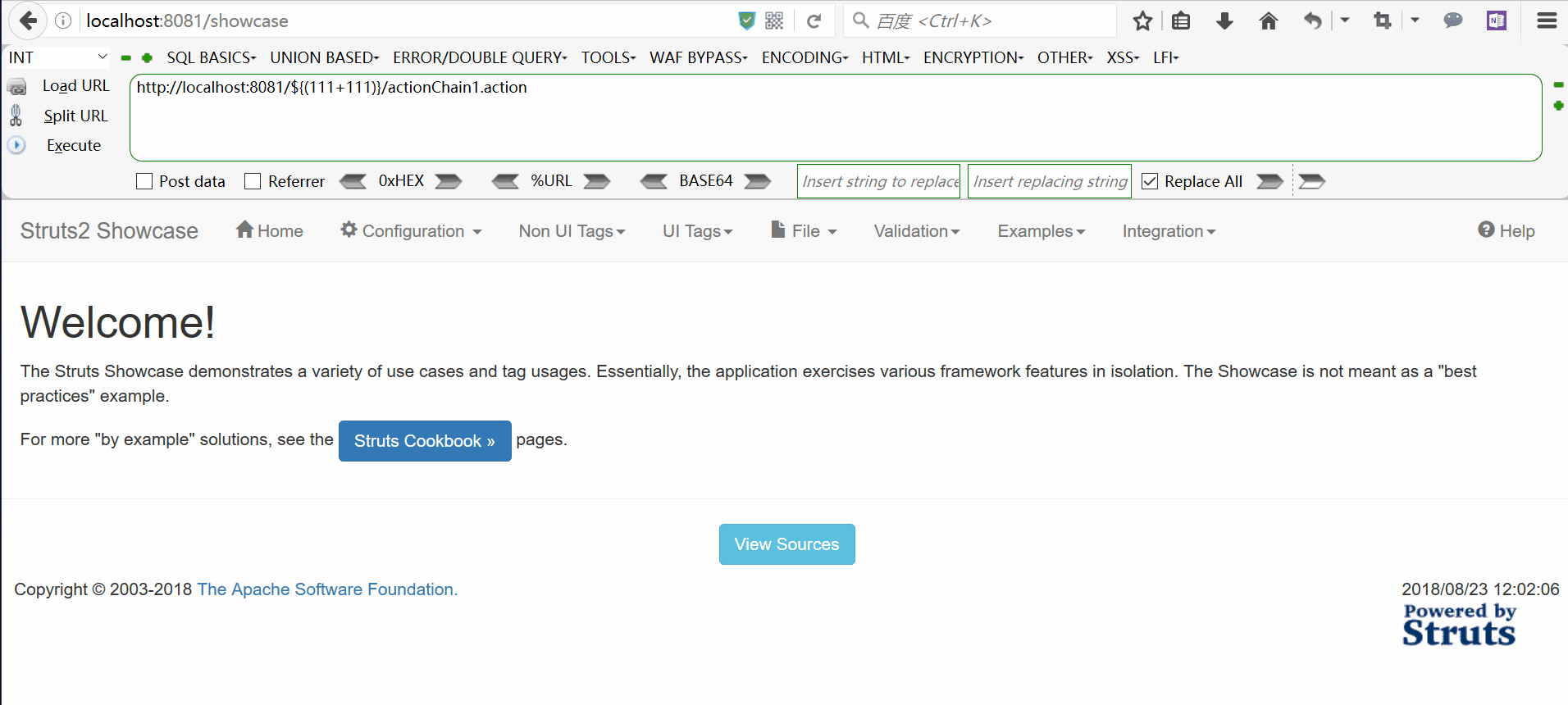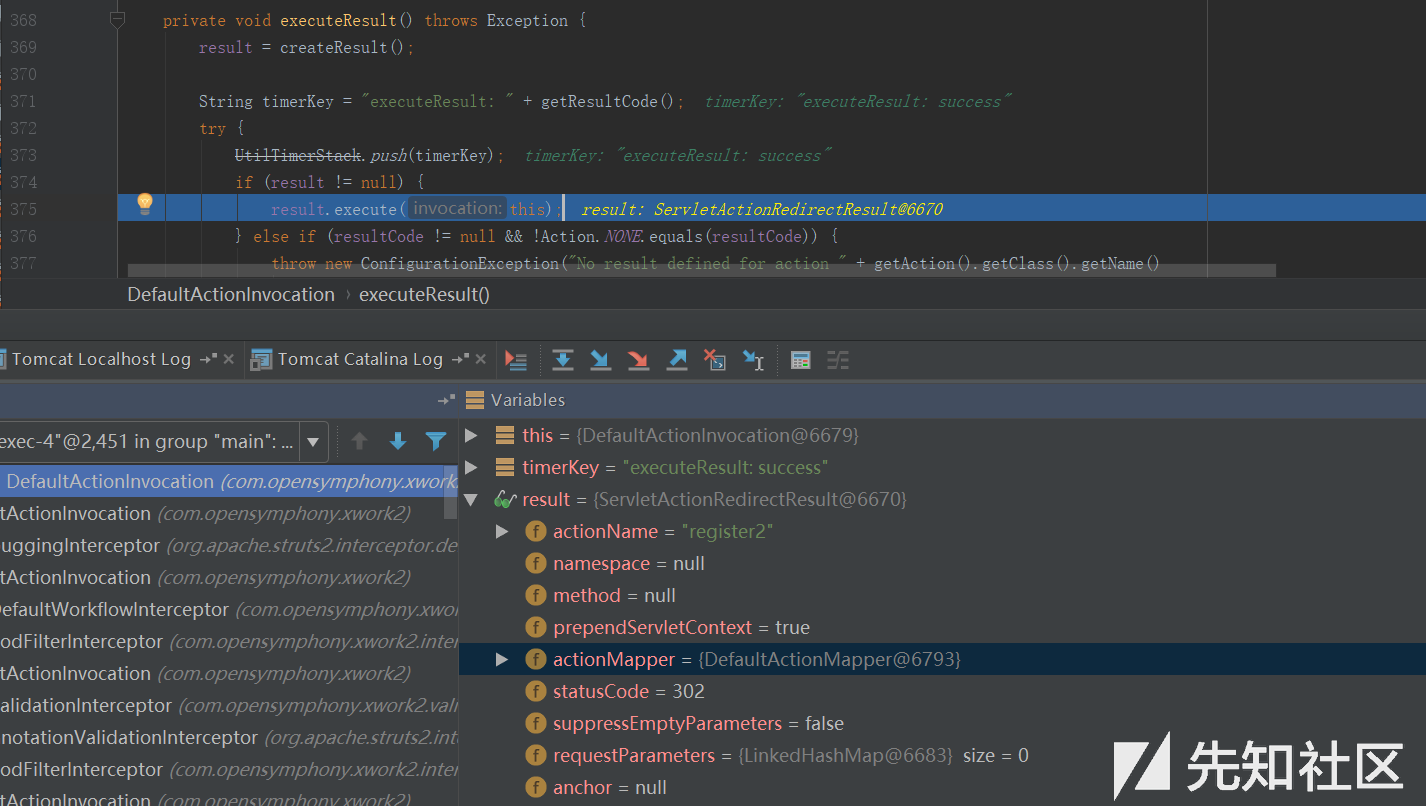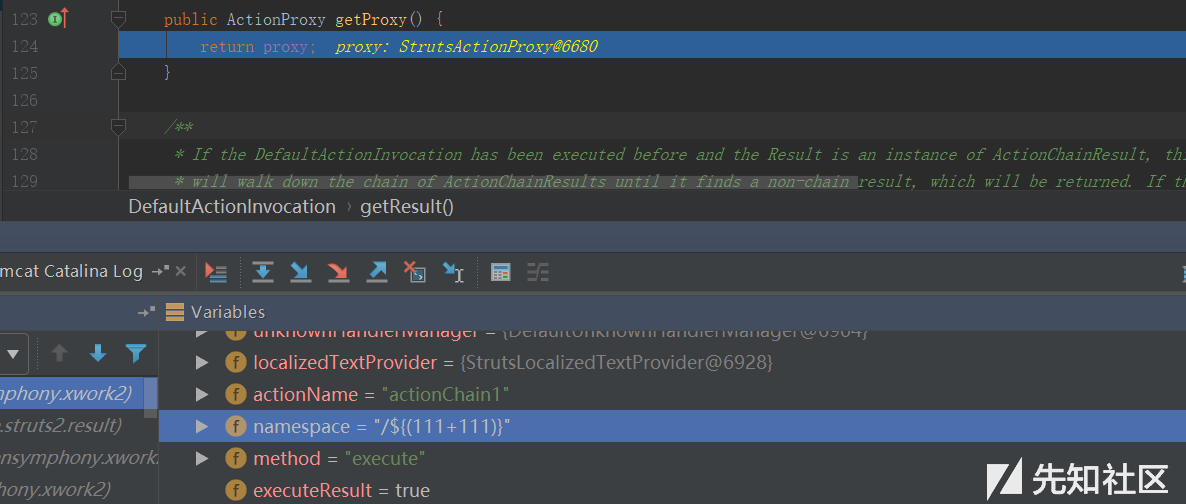【Struts2-代码执行漏洞分析系列】S2-057
漏洞公告
https://cwiki.apache.org/confluence/display/WW/S2-057
问题:
It is possible to perform a RCE attack when namespace value isn't set for a result defined in underlying xml configurations and in same time, its upper action(s) configurations have no or wildcard namespace. Same possibility when using url tag which doesn’t have value and action set and in same time, its upper action(s) configurations have no or wildcard namespace.

漏洞发现者的博客: https://lgtm.com/blog/apache_struts_CVE-2018-11776
环境搭建
下载 https://archive.apache.org/dist/struts/2.5.16/struts-2.5.16-all.zip
IDEA中打开,修改apps/showcase/src/main/resources/struts-actionchaining.xml 为:
<!DOCTYPE struts PUBLIC
"-//Apache Software Foundation//DTD Struts Configuration 2.5//EN"
"http://struts.apache.org/dtds/struts-2.5.dtd">
<struts>
<package name="actionchaining" extends="struts-default">
<action name="actionChain1" class="org.apache.struts2.showcase.actionchaining.ActionChain1">
<result type="redirectAction">
<param name = "actionName">register2</param>
</result>
</action>
</package>
</struts>
同时查看 org/apache/struts2/default.properties:201 ,其值为true
### Whether to always select the namespace to be everything before the last slash or not
struts.mapper.alwaysSelectFullNamespace=true访问: http://localhost:8081/${(111+111)}/actionChain1.action

url变为: http://localhost:8081/222/register2.action
111+111=222 即产生了OGNL注入。
漏洞分析
这次的漏洞可以有多种攻击向量,根据漏洞作者blog有:
以上提及的三种都属于Struts2的跳转方式。在 struts-default.xml:190(截取部分)
<result-types>
<result-type name="chain" class="com.opensymphony.xwork2.ActionChainResult"/>
<result-type name="redirectAction" class="org.apache.struts2.result.ServletActionRedirectResult"/>
<result-type name="postback" class="org.apache.struts2.result.PostbackResult" />
</result-types>
为清楚起见,这里解释一下strut2中对默认result对象的处理过程。这些默认result type都要经过 com/opensymphony/xwork2/DefaultActionInvocation.java:367 处理
private void executeResult() throws Exception {
result = createResult();
String timerKey = "executeResult: " + getResultCode();
try {
UtilTimerStack.push(timerKey);
if (result != null) {
result.execute(this);
}
...
}
首先通过result = createResult()获取到相应的result对象。如果result不为null则执行result.execute(this);。这个execute方法则由具体result对象实现。
有一些具体的result对象比如下面提到的Redirect action和Postback result,会产生一个跳转地址location,并传入org/apache/struts2/result/StrutsResultSupport.java:194:
/**
* Implementation of the <tt>execute</tt> method from the <tt>Result</tt> interface. This will call
* the abstract method {@link #doExecute(String, ActionInvocation)} after optionally evaluating the
* location as an OGNL evaluation.
*
* @param invocation the execution state of the action.
* @throws Exception if an error occurs while executing the result.
*/
public void execute(ActionInvocation invocation) throws Exception {
lastFinalLocation = conditionalParse(location, invocation);
doExecute(lastFinalLocation, invocation);
}
而conditionalParse定义如下,将会执行OGNL表达式。
/**
* Parses the parameter for OGNL expressions against the valuestack
*
* @param param The parameter value
* @param invocation The action invocation instance
* @return the resulting string
*/
protected String conditionalParse(String param, ActionInvocation invocation) {
if (parse && param != null && invocation != null) {
return TextParseUtil.translateVariables(
param,
invocation.getStack(),
new EncodingParsedValueEvaluator());
} else {
return param;
}
}
所以可以看到重点是StrutsResultSupport中conditionalParse(location, invocation)的location变量。
接下来部分就关注三种result-type的具体实现和具体攻击点。
攻击点一:Redirect action
apps/showcase/src/main/resources/struts-actionchaining.xml 中注意<result>标签中<type>为redirectAction:
<result type="redirectAction">
<param name = "actionName">register2</param>
</result>
redirectAction对应的处理类为org.apache.struts2.result.ServletActionRedirectResult
在 com/opensymphony/xwork2/DefaultActionInvocation.java:368

跟入redirectAction的execute方法即 org/apache/struts2/result/ServletActionRedirectResult.java:160
public void execute(ActionInvocation invocation) throws Exception {
actionName = conditionalParse(actionName, invocation);
if (namespace == null) {
namespace = invocation.getProxy().getNamespace();
...
}

由于在配置xml时没有指定naPmespace,所以这里的namespace为null,将会执行invocation.getProxy().getNamespace();

所以执行后对于result对象的namespace即为/${(111+111)}。
同一函数中继续执行 172行
public void execute(ActionInvocation invocation) throws Exception {
...
String tmpLocation = actionMapper.getUriFromActionMapping(new ActionMapping(actionName, namespace, method, null));
setLocation(tmpLocation);
super.execute(invocation);
}
ActionMapping生成如下,this.namespace值赋为/${(111+111)}:

跟入getUriFromActionMapping:
public String getUriFromActionMapping(ActionMapping mapping) {
StringBuilder uri = new StringBuilder();
handleNamespace(mapping, uri);
handleName(mapping, uri);
handleDynamicMethod(mapping, uri);
handleExtension(mapping, uri);
handleParams(mapping, uri);
return uri.toString();
}
handleNamespace处理结果如下:

当函数返回,tmpLocation值为/${(111+111)}/register2.action,然后通过setLocation(tmpLocation)使得location变量值为/${(111+111)}/register2.action,从而最终造成OGNL注入。

攻击点二: Action chaining
apps/showcase/src/main/resources/struts-actionchaining.xml 中注意<result>标签中<type>为chain:
<result type="chain">
<param name = "actionName">register2</param>
</result>

同样会先经过result = createResult(),然后调用result.execute(this);。这会进入到 com/opensymphony/xwork2/ActionChainResult.java:203
public void execute(ActionInvocation invocation) throws Exception {
// if the finalNamespace wasn't explicitly defined, assume the current one
if (this.namespace == null) {
this.namespace = invocation.getProxy().getNamespace();
}
ValueStack stack = ActionContext.getContext().getValueStack();
String finalNamespace = TextParseUtil.translateVariables(namespace, stack);
String finalActionName = TextParseUtil.translateVariables(actionName, stack);
...
}
由于没有设定namespace,所以通过invocation.getProxy().getNamespace()使得this.namespace值为/${(111+111)}。然后调用了String finalNamespace = TextParseUtil.translateVariables(namespace, stack);对namespace进行OGNL解析。如下

攻击点三:Postback result
apps/showcase/src/main/resources/struts-actionchaining.xml 中注意<result>标签中<type>为postback:
<result type="postback">
<param name = "actionName">register2</param>
</result>

经过result = createResult(),跟入定位到postback这个result对象的处理方法,在 org/apache/struts2/result/PostbackResult.java:113
@Override
public void execute(ActionInvocation invocation) throws Exception {
String postbackUri = makePostbackUri(invocation);
setLocation(postbackUri);
super.execute(invocation);
}
跟入makePostbackUri1,在org/apache/struts2/result/PostbackResult.java:129
protected String makePostbackUri(ActionInvocation invocation) {
ActionContext ctx = invocation.getInvocationContext();
HttpServletRequest request = (HttpServletRequest) ctx.get(ServletActionContext.HTTP_REQUEST);
String postbackUri;
if (actionName != null) {
actionName = conditionalParse(actionName, invocation);
if (namespace == null) {
namespace = invocation.getProxy().getNamespace();
} else {
namespace = conditionalParse(namespace, invocation);
}
...
postbackUri = request.getContextPath() + actionMapper.getUriFromActionMapping(new ActionMapping(actionName, namespace, method, null));
}
...
return postbackUri;
}

获取到namespace值为/${(111+111)}。跟入actionMapper.getUriFromActionMapping(new ActionMapping(actionName, namespace, method, null)),其具体执行过程如攻击点一[Redirect action]提到的那样,设置namespace等参数,然后从getUriFromActionMapping中返回uri。最后组装的postbackUri为/${(111+111)}/register2.action

回到前面的execute中通过setLocation(postbackUri)设置了location变量:

此后location变量传入,造成OGNL表达式注入
